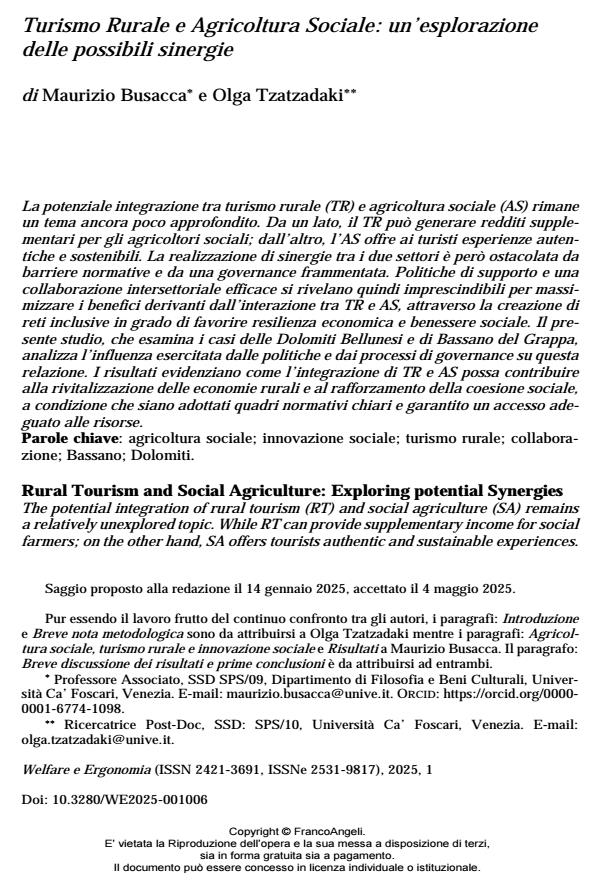Turismo Rurale e Agricoltura Sociale: un’esplorazione delle possibili sinergie
Titolo Rivista WELFARE E ERGONOMIA
Autori/Curatori Maurizio Busacca, Olga Tzatzadaki
Anno di pubblicazione 2025 Fascicolo 2025/1
Lingua Italiano Numero pagine 18 P. 93-110 Dimensione file 110 KB
DOI 10.3280/WE2025-001007
Il DOI è il codice a barre della proprietà intellettuale: per saperne di più
clicca qui
Qui sotto puoi vedere in anteprima la prima pagina di questo articolo.
Se questo articolo ti interessa, lo puoi acquistare (e scaricare in formato pdf) seguendo le facili indicazioni per acquistare il download credit. Acquista Download Credits per scaricare questo Articolo in formato PDF

FrancoAngeli è membro della Publishers International Linking Association, Inc (PILA)associazione indipendente e non profit per facilitare (attraverso i servizi tecnologici implementati da CrossRef.org) l’accesso degli studiosi ai contenuti digitali nelle pubblicazioni professionali e scientifiche
La potenziale integrazione tra turismo rurale (TR) e agricoltura sociale (AS) rimane un tema ancora poco approfondito. Da un lato, il TR può generare redditi supplementari per gli agricoltori sociali; dall’altro, l’AS offre ai turisti esperienze autentiche e sostenibili. La realizzazione di sinergie tra i due settori è però ostacolata da barriere normative e da una governance frammentata. Politiche di supporto e una collaborazione intersettoriale efficace si rivelano quindi imprescindibili per massimizzare i benefici derivanti dall’interazione tra TR e AS, attraverso la creazione di reti inclusive in grado di favorire resilienza economica e benessere sociale. Il presente studio, che esamina i casi delle Dolomiti Bellunesi e di Bassano del Grappa, analizza l’influenza esercitata dalle politiche e dai processi di governance su questa relazione. I risultati evidenziano come l’integrazione di TR e AS possa contribuire alla rivitalizzazione delle economie rurali e al rafforzamento della coesione sociale, a condizione che siano adottati quadri normativi chiari e garantito un accesso adeguato alle risorse.
Parole chiave:agricoltura sociale; innovazione sociale; turismo rurale; collaborazione; Bassano; Dolomiti.
Maurizio Busacca, Olga Tzatzadaki, Turismo Rurale e Agricoltura Sociale: un’esplorazione delle possibili sinergie in "WELFARE E ERGONOMIA" 1/2025, pp 93-110, DOI: 10.3280/WE2025-001007